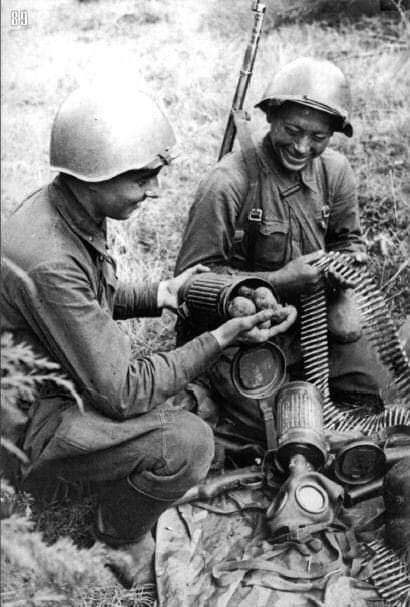What did Wehrmacht soldiers carry in their gas mask canisters?
The currently defunct web site of the Erste Zug reenactment group used to host several veteran interviews, most of which were originally published in Eric Tobey’s “Die Neue Feldpost” zine in the 1990s. The interviews were with soldiers who fought in a variety of units, different branches, different fronts. Here is what the veterans had to say on this.
Kurt Wegner, Grenadier-Regiment 914, interviewed by Vince Milano in 1993, when asked, “Did you ever throw away your gasmask?” answered, “Not until June 7, 1944. No one ever checked us for them in the entire time of the fighting.”
Leutnant Eberhard von Machui, of Artillerie-Regiment 28, when prompted to “describe your food in the field,” stated that every soldier was issued an iron ration which he kept in his bread bag. If a soldier could obtain an extra one he would keep it in his gas mask container after throwing away his gas mask. Lots of masks were thrown away in his unit, although the punishment for this was harsh, for example extra guard duty or deductions from pay for loss of the mask.
Josef Bieburger was a late war recruit in the Luftwaffe. In 2006 he described his training to my friend Glenn McPherson. “Our Feldwebel was a good guy. He had a big belly, and liked to laugh. One funny story when we were training. The area we trained and drilled on has a hill – it was called “Idiots Hill” – and nearby there were cherry fruit trees. Our Feldwebel was hungry this particular afternoon, and as I was the youngest and littlest of the unit, sent me on a mission. He gave me his empty gas mask container and sent me into the trees saying, “Josef – there is the Enemy! Go and take them prisoner!” So, I returned with his gas mask full of cherries and he was happy.”
William Lubbeck, author of “At Leningrad’s Gates,” a memoir of his time on the Eastern Front, was asked, “Did you throw away your gas mask?” He answered, “Put it on two or three times during the French campaign in 1940, but did not carry it after we reached Leningrad in 1941.”
Gustav Rewwer, who served on the Eastern Front in a Fallschirm-Panzergrenadier unit, and who I interviewed, told me that he retained his gas mask container, but that he discarded the gas mask and used the carrier to hold extra rations.
Gustav, a veteran of the SS-Panzer-Division “Das Reich,” and who did not want to use his full name, said in 1993, “We were going to have a gas mask inspection. Some men threw their masks away and put their papers in the can because it was waterproof. Before an inspection, the soldiers who had thrown their masks away would find one to borrow in another company who was not having an inspection. But I never threw mine away. While everyone was running around to find a mask, I would rest. We are in formation and the Scharführer gives me the command. I whip my can around and pop the lid. The Scharführer reaches in and pulls out a pair of ladies underwear. Huge ones, big enough for a cow. He’s standing there, they are blowing in the breeze. No mask, someone pinched my mask, Gaenzenbittel pinched my mask. This was not funny to the command, but even the Scharführer looked like he was going to laugh. Inspection over, we got extra work. We had to dig holes for Panzers.”
Gerd Hörner, interviewed by Brad Hubbard in 2002-2003, was asked about his time in Grenadier-Regiment 980. He said, “We put our socks and Fusslappen [foot wraps] in the gas mask canister and our writing implements in the gas sheet bag.”
Hans Melker of Grenadier-Regiment 169 was asked in 1993 if he threw his mask away. He replied, “No, they checked you for them and you could get into trouble if you didn’t have one. There was a special Unteroffizier who checked you for them. I did not want to get into trouble.”
These interview snippets that were compiled from one source provide a wealth of detail. We are lucky that earlier generations of reenactors recorded these interviews. Most veteran memoirs do not mention the contents of the gas mask canister. This detail was probably not seen as important by most soldiers looking back, though there are no doubt many references to discover, among the countless reminisces that have survived.
I find it interesting how consistent the responses are, in the tiny sample of interviews cited here. Clearly, soldiers knew they might be punished for not carrying the mask, and some did carry it. It’s also clear that some soldiers discarded the masks. In some units, it seems, nobody was checking. And even where inspections did happen, some soldiers found ways around it, and avoided punishment despite not having masks.
I have heard it alleged that the idea that German soldiers often carried something other than the mask in the canister or that they threw the masks away was a myth, a reenactorism. I wonder where that “myth” would have come from? In reality, there was an era of reenacting in which it was very common to encounter and interview German veterans, when they were in their 70s, and often with very sharp memories. It used to be possible to ask veterans about this, I asked veterans about this, and many told me they threw away their masks and used the canister for other things. And many other reenactors heard this from many other veterans, and some of these conversations were documented, and this documentation is abundant and clear. There are other sources that support this as well. Lots of soldiers threw their masks away.
